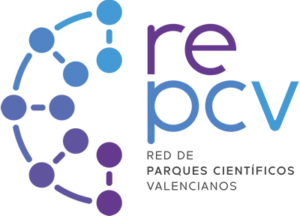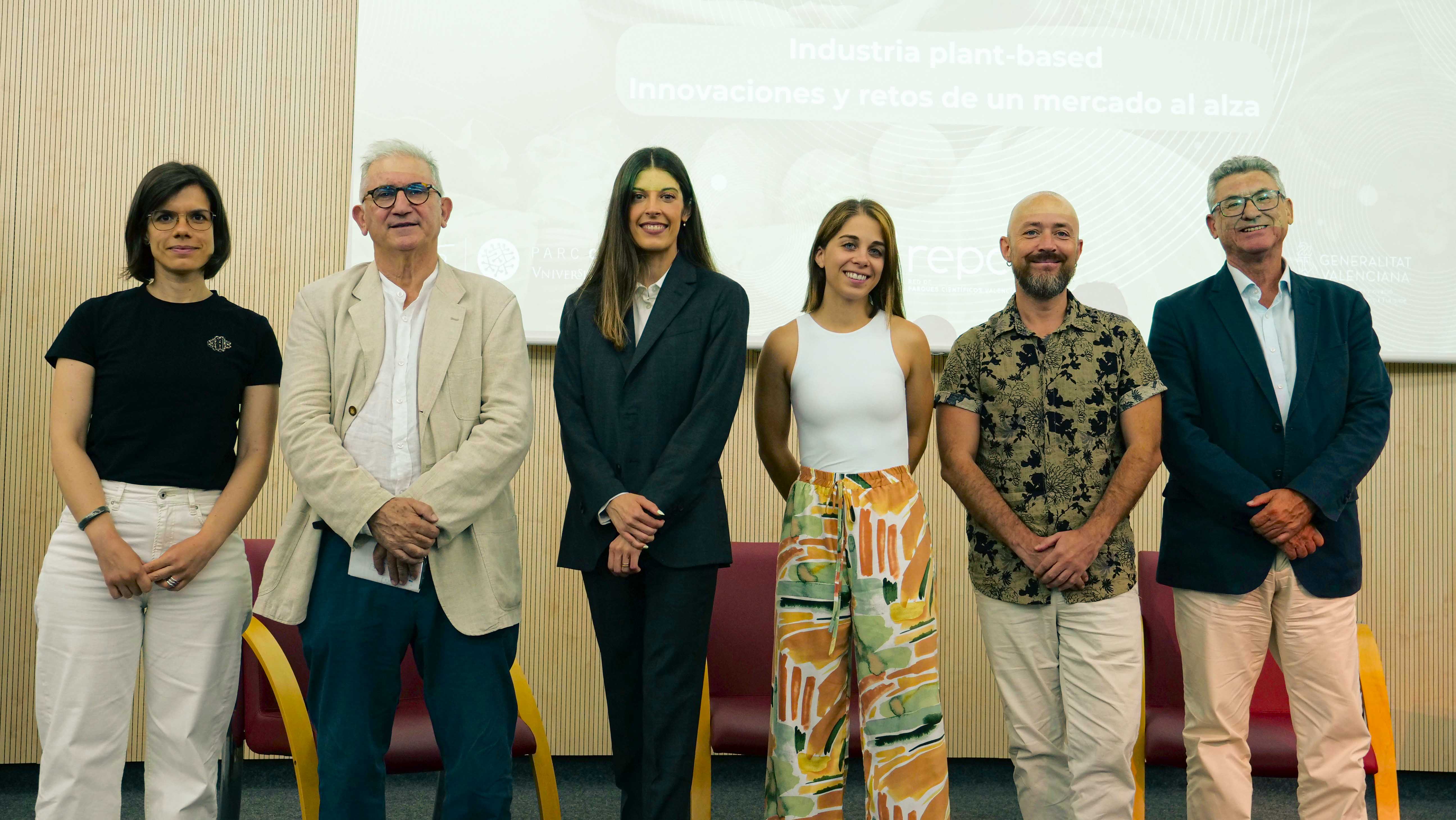Companies, research groups and reference entities in the food sector analyzed the keys to the plant-based industry at the Innotransfer technical event held in June at the University of Valencia Science Park (PCUV)
On the horizon of the transition to an increasingly sustainable food system, through promoting the consumption of plant-based proteins to replace animal-based proteins, plant-based foods in Spain constitute a market valued at 447.4 million euros, and the European market is expected to reach 14,908 million euros in 2029. Due to its outstanding potential in global sustainability, the Innotransfer event, the open innovation program promoted by the five Valencian science parks with the support of the Regional Ministry of Innovation, Industry, Trade and Tourism, held on June 26 at the Marie Curie Auditorium of the University of Valencia Science Park, dedicated a technical conference with the participation of leading professionals from the fields of research and industry to analyze the opportunities of this emerging market.
In welcoming the day, Pedro Carrasco, director of the University of Valencia Science Park, gave a speech in which he indicated the need to develop initiatives that promote the establishment of meeting points between companies, sectorial entities and research groups. "The objective is to materialize projects and collaborations that bring innovative developments to the productive fabric. "The plant-based sector is in constant growth and of profound social interest because it is trying to create products that favor a diet that prioritizes the consumption of plant-based foods, reducing the consumption of animal-based foods," said the director of the PCUV.

Francisco Javier Sogorb Guerra, deputy director general for the Advancement of the Digital Society and Enabling Technologies of the Valencian Government, thanked the social work done by science parks as "key players in innovation, acting as drivers towards the productive fabric of the knowledge generated within the university" and stressed the importance of "feeding an increasingly growing population in a sustainable and healthy way". "It is essential that experts in food and disruptive technologies come together, exchange ideas, concepts, problems, solutions, generate synergies and strategic alliances," explained Sogorb.

Opportunities for vegetable protein
Aiming to create products that favor a diet that prioritizes the consumption of plant-based foods in order to reduce animal-based foods, the commitment to plant-based production, a food category that values plant proteins, is expected to have a growing market forecast. The trend responds to the growing interest of consumers in health care, animal welfare and the reduction of the environmental impact of food production.
The first table of the day addressed the advantages of vegetable protein and the importance of the factors to commercialize these products. José Benedito Fort, professor and director of the Department of Food Technology and researcher at the University Institute of Food Engineering-FoodUPV of the Polytechnic University of Valencia, which researches fermentations in legumes and other types of seeds, and the extraction of proteins for the development of new products with a better nutritional, healthy and sustainable profile, pointed out that "more than a label, plant-based should be a philosophy that helps to reduce animal protein and replace it with vegetable protein". "It is essential to know the environmental impact of everything we do to know if the production is really more sustainable or just a label we put on it," Benedito warns.
"If there are people who love the taste of meat, a plant-based hamburger is not going to appeal to them. But if you like meat as an ingredient and combine it with others, there are many foods where meat is simply an extra and in these cases it is easily substitutable," says Mercedes Diez Cocero, director of Technical Development at Madeinplant, a company linked to AgrotecUV dedicated to plant biotechnology specialized in the production of recombinant proteins in plants. Diez pointed out the advantages of plants for production such as the possibility of producing complex modifications in proteins, selection and low production costs and a low risk of contamination with human pathogens, in addition to the ease of scaling up. "Our company has two main lines of business. The first corresponds to the production of recombinant proteins in nicotine plants, which we use as a biofactory, and the second to the development of biotechnological tools to reprogram plants and improve their agronomic profile, their nutritional content, their resistance to stress, with great relevance for the plant-based industry sector, both in applications in the agri-food and cosmetic sectors," Diez describes.

M.ª Carmen Garrigós Selva, director and head of the area of chemical analysis of materials in the NANOBIOPOL Research Group of the University of Alicante, with research projects framed in the circular economy, develops lines such as the design of cascade extraction procedures in agri-food waste in which to analyze the composition and explore the possibilities of recovery to obtain ingredients in cascade, "through sustainable and low-cost processes, based on microwaves, also in ultrasound, to obtain antioxidants, proteins or lipids. The idea is to carry out an integral valorization based on the composition of the waste. We try to couple the ingredients to different applications where we always offer opportunities to companies. These ingredients can be included in proteins as substitutes for those of animal origin. We also develop biomaterials, where we include these same proteins to develop biodegradable materials in the food sector for packaging and functional food," explains Garrigós.
On the definition of the sector, Rubén Parrilla Valladolid, Market Intelligence Director of Alnut, a company that covers family food (infant and adult) and also for pets, pointed to the debate that represents the consideration of plant-based. "It is true that in certain products, such as plant-based beverages, there is no doubt about the limitation between what is an animal-based product and a substitute, however, it is still not clear in other types of products. Doubts still arise when defining whether the addition of plant-based proteins justifies that it can be considered plant-based. We are developing fortified creams. For example, do we consider a spinach cream to be plant-based simply because we introduce a bean protein and if water is really among the ingredients to give it texture and not with the aim of increasing the protein," says Parrilla.

Much more than food
After the first round table, the day was followed by a dissertation on European partnerships in agri-food of the Center for Technological Development and Innovation (CDTI), by Verónica Estruch Giner, European projects technician of this organization, whose presentation focused on addressing the opportunities under Horizon Europe of the major Framework Program for Research and Innovation through actions for the management and promotion of Spanish participation in international programs for technological cooperation in the field of agri-food sector.

The possibilities of the plant-based sector also go beyond the food industry. The advantages of plant protein applications in research, pharmaceuticals and cosmetics were the focus of the second round table. "The plant-based concept is fundamental, more than differentiating it from animal-based, because of its non-synthetic origin, since many of the active compounds that we extract can also be produced chemically, but unlike the chemical method, the plant-based method is more sustainable and efficient," emphasized José Tomás Matus Picero, Ramón y Cajal researcher at the Institute of Integrative Systems Biology (I2SysBio, UV - CSIC), for whom the development of the plant-based sector represents a sustainable opportunity like cell cultures.
"The compounds we can generate can be from pharmaceuticals, nutraceuticals or cosmetics. In the latter case we are working much more. Each area has its own regulations, which makes it very difficult and there are companies that bet more on one sector than another, depending on the benefits and opportunities. It is necessary to know in advance the problems that each one can bring in terms of regulations. If you use a derivative of a plant or a microorganism that produces the compound, you can take it to a fruit or as a nutraceutical element depending on its origin. In our case, we use microalgae as a chassis for the production of these metabolites and modifying or increasing the production of some compounds of interest, and depending on one side or the other, the regulations can be more complicated", the researcher points out.

Plants hold great potential. Cristina Prieto López, researcher at the New Materials and Nanotechnology for Food Applications Group of the Institute of Agrochemistry and Food Technology (IATA - CSIC) and collaborator in development projects with the company Bioinicia. The researcher pointed out that the sector "represents new ingredients for the food and cosmetics industry, as well as for pharmaceuticals and packaging". "The properties of plants never cease to surprise us. Materials are being developed that are going to revolutionize the market. They can provide us with a large number of active compounds, also polymeric matrices, often polysaccharides or proteins that are very interesting. In the case of the company, we work with by-products from the agri-food industry, for example, broccoli, which has very interesting active ingredients that are now in the cosmetic patches we are commercializing and is a revolution", celebrates Prieto.
From the field of seaweed and the development of its ingredients for application in food, nutraceuticals and cosmetics as a sustainable alternative, Silvia Antón Sempere, co-founder and CPO of Mediterranean Algae, a young company born in 2021 and linked to AgrotecUV, highlighted her company's use of both the raw material, seaweed, and the waste destined to develop new materials such as cosmetics and others. "We are looking for a high yield of compounds and a standardization of those processes and then scaling up. It is key to join calls for proposals with research groups, with technology centers where we can develop new applications. The main barrier for a small company is scaling up. Right now it is difficult to find a partner that can scale the processes we propose. We depend on the technology, its degree of advancement, and regulation. Every time a novel food appears, we get scared as a startup. Regulation is quite tedious, and it differs from country to country. We have a lot to learn from the United States in terms of regulation," says Antón.

The case of Veganic Nature
The closing of the day came from Belén Torregrosa, marketing director of Veganic Nature, an agricultural biocontrol company, who explained the company's value proposition towards new technologies and products within the framework of innovation and sustainability in the agricultural sector.






